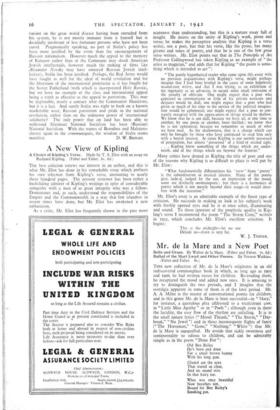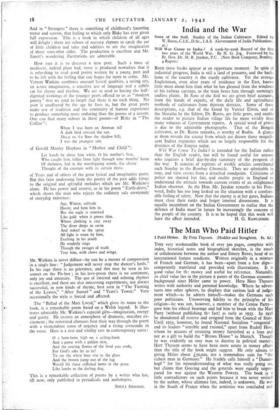Mr. de la Mare and a New Poet
Tins new collection of Mr. de la Mare's originates in an old rediscovered commonplace book in which, as long ago as 1905 and 1906, he had written verses for children. Re-reading them, he recaptured the mood and added new ones. It is amusing to try to distinguish the two periods, and I imagine that the nostalgia apparent in some of them is of the later period. Mr. A. A. Milne is the master of conversational poems for children, and in this genre Mr. de la Mare is least successful—in " Mary," for instance, a querulous plea addressed to a recalcitrant cow, in " Little Miss Apathy " or in " Pooh " ; although even in these the lucidity, the easy flow of the rhythm are unfailing. It is in the small nature lyrics (" Missel Thrush," "The Storm," "Day- break," " No Jewel ") and in those inconsequent flights of fancy (" The Horseman," " Gone," " Nothing," " White ") that Mr: de la Mare is unequalled. He avoids that sickly sweetness and sentimentality so odious to children, and can be admirably simple as in the poem " Done For ":
Old Ben Bailey He's been and done For a small brown bunny With his long gun.
Glazed are the eyes That stared so clear, And no sound stirs In that hairy ear.
What was once beautiful Now breathes not, Bound for Ben Bailey's Smoking pot. And in " Strangers " there is something of childhood's haunting terror and sorrow, that feeling to which only Blake has ever given full expression. This is a book in which children of all ages will delight ; there are echoes of nursery rhymes to cinch the ear of little children and tales and oddities to stir the imagination of those somewhat older. The production is excellent and Mr. Emett's wandering illustrations are admirable.
How rare it is to discover a new poet. Such a mass of mediocre, indeed plain bad, verse is produced nowadays that it is refreshing to read good poetry written by a young poet and to be left with the feeling that one hopes for more to come. Mr. Vernon Watkins combines unusual lyrical qualities, a seeing eye, an active imagination, a sensitive use of language and a subtle ear for rhyme and rhythm. We are so used to having the half- digested workings of the younger poets offered to us as "modern poetry " that we tend to forget that there is no such thing. No poet is unaffected by the age he lives in, but the great poets make use of tradition and the continuity of human experience to produce something more enduring than the poems of a season. One can find many echoes in these poems—of Blake in " The Collier ":
When I was born on Amman hill A dark bird crossed the sun.
Sharp on Ile floor the shadow fell; I was the youngest son.
of Gerald Manley Hopkins in " Mother and Child ": Let hands be about him white, 0 his mother's first, Who caught him, fallen from light through nine months' haste Of darkness, hid in the worshipping womb, the chaste Thought of the creature with its certain thirst.
of Yeats and of others of the great lyrical and imaginative poets. But this faint undersong from the poetry of the past adds virtue to the original and splendid melodies which are Mr. Watkins's alone. He has power and reserve, as in his poem " Earth-dress," which shows the man who rejects the ordinary safe anonymity of everyday existence:
Age, Winter, solitude
Hover, and hem him in.
But the eagle is renewed Like gold when it grows thin.
Where clothing is cast away The diver drops to swim And naked in the spray All light is worn by him, Exulting in his youth He tenderly sings Though the ravages of truth
Tear him, with claws and wings.
Mr. Watkins is never diffuse—he can be a master of compression in a single line: " Judgement will never stop the dancer's heels." In his rage there is no grievance, and this may be seen in his sonnet on the Pit-boy ; in his love-poem there is no sentiment, only joy and intensity. The use of internal and echoing rhymes is excellent, and there are also interesting experiments, not always successful, in new kinds of rhyme, best seen in " The Turning of the Leaves," " After Sunset " and " Yeats's Tower." Very occasionally the style is forced and affected.
The " Ballad of the Mari Lwyd," which gives its name to the book, is a remarkable poem based on a Welsh legend. It illus- trates admirably Mr. Watkins's especial gifts—imagination, energy and gaiety. He creates an atmosphere of dramatic, macabre ex- citement ; the reiterated choruses beat their way through the poem with a tremendous sense of urgency and a rising crescendo in the verse. Here is a zest and vitality rare in contemporary verse : 0 a ham-bone high on a ceiling-hook
And a goose with a golden skin,
And the roaring flames of the food you cook; For God's sake let us in!
To see the white beer rise in the glass
And the brown jump out of the jug Would lift those stiffened loons in the grass Like lambs to the darling dug.
This is a remarkable collection of poems by a writer who has, till now, only published in periodicals and anthologies.
SHEILA SHANNON.



























 Previous page
Previous page